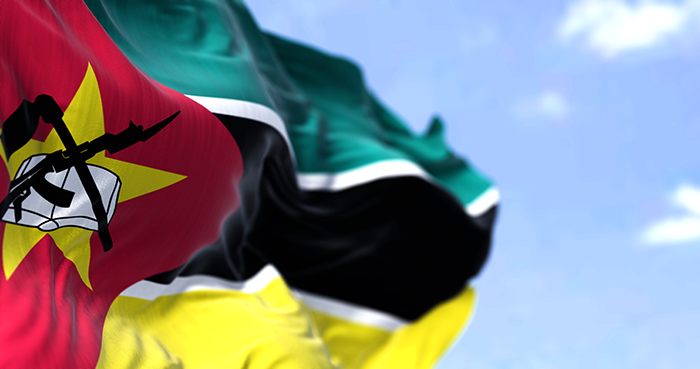Analyses / Africa/s
7 February 2025
Mozambique: Between Wealth and Vulnerabilities, an Analysis of Tensions

Although it was long considered a model of reconstruction in the aftermath of the civil war, which ended with the 1992 peace accords, recent developments in Mozambique reveal the decline of the former Portuguese colony. The strategic importance of the Mozambique Channel, as well as the country’s potential weight in the global energy market, are key factors that make this Southern African nation—highly exposed to climate change—a crucial player in both regional and international geopolitics. Here is an overview of the main issues shaping the country’s current affairs.
Political Crisis: A Never-Ending Story?
The October 2024 elections were meant to determine the successor to Filipe Nyusi, whose two terms were marred by multiple corruption scandals. To replace the outgoing president, the Frente de Libertação de Moçambique (FRELIMO), the liberation party that has ruled since independence in 1975, championed Daniel Chapo. A former administrator of the Palma district, his subordination to the party’s leadership appeared to be his main qualification for candidacy. Opposing him, the main opposition figure was Venancio Mondlane. After leaving the Resistência Nacional Moçambicana (Renamo), which he criticised for its lack of support during the 2023 municipal elections in the capital, Maputo, this talented orator managed to inspire hope for structural change among a youth that no longer identifies with its leaders.
The announcement of Daniel Chapo’s victory with nearly 71% of the vote on 9 October sparked public outrage, first in Maputo, amid widespread accusations of electoral fraud. Venancio Mondlane, credited with 20% of the vote, called on citizens to protest in a climate of already heightened tensions in the capital. On 19 October, his lawyer, Elvino Dias, along with a Podemos party official, were assassinated in an ambush as they prepared to file a legal challenge before the Constitutional Court to contest the election’s legitimacy.
The police crackdown on the expanding protests across the country highlights the reality of a one-party state determined to maintain its grip on power. Ahead of the elections, the government had sought military intervention to secure the capital, a request the army refused, stating that its role was to defend national interests rather than political parties. By 15 January, the day of President Chapo’s inauguration, police repression had already resulted in over 300 civilian deaths, with eyewitness reports confirming live ammunition and vehicles being used against demonstrators. Having returned to Mozambique after several weeks in exile, the opposition leader continues to call for a general strike.
The persistence of protests and the country’s economic paralysis underscore a revolt that extends beyond electoral disputes. The opposition has evolved into a broader challenge against a one-party system tainted by repeated corruption scandals in recent years, whose promises of development have left behind a particularly vulnerable population.
Cyclone Chido: Consequences and Multiple Exposures
After devastating Mayotte just hours earlier, Cyclone Chido struck the northern coast of Mozambique, particularly affecting the regions of Nampula and Cabo Delgado. Located nearly 2,500 km from the capital, this area—highly exposed to climate change—suffered damage similar to that seen in the French department. Nearly 500,000 people were affected by the disaster, with over 100,000 homes destroyed. The provisional human toll stands at approximately 120 deaths and 868 serious injuries. However, these estimates should be taken with caution, given the Mozambican state’s difficulties in effectively controlling this region and providing essential services.
During a visit to the affected area, newly elected President Daniel Chapo called on the population to donate food and clothing—a statement that sparked controversy, given the deep poverty in which these communities are already immersed. Their vulnerability is further exacerbated by the presence of nearly 700,000 internally displaced people in these regions since 2017, a large proportion of whom are women and children.
Beyond the destruction and damage caused by the cyclone—such as the devastation of crops, healthcare centres, and communication networks—the aftermath has also triggered cascading effects, particularly health-related, with numerous cholera cases already reported. Additionally, looting and violence have surged. The severity of the humanitarian crisis appears to far exceed the response capacities of both the government and humanitarian organisations. Many aid groups have called for urgent funding and the delivery of assistance materials to a region that paradoxically combines extreme poverty with significant mineral wealth.
A Long-Neglected Energy and Mining Player
While African energy giants such as the Democratic Republic of Congo and Nigeria dominate international attention, Mozambique—long overlooked—possesses resources that have recently propelled it to the centre of global interests, attracting numerous players eager to establish a foothold. The mining sector is one of the country’s main sources of exports, generating nearly $6.7 billion. The Moatize coal mine, operated by the Indian group Jindal, is one of Mozambique’s key mining sites. The company has faced allegations of human rights violations, accusations that were previously levelled against its Brazilian predecessor, Vale.
While other international actors are also involved in the extraction of minerals such as graphite and titanium, the most contentious site remains the Montepuez ruby mine in Cabo Delgado. Operated by a British-Mozambican joint venture, the mine has been mired in allegations of conflicts of interest and corruption from the outset, as the Mozambican company Mwriti was created after one of FRELIMO’s leaders discovered the deposits. Since then, reports of violence against local communities and the use of gangs to secure the site have only exacerbated regional tensions, to which Maputo has struggled to provide a convincing response.
Finally, the discovery of significant offshore gas reserves in 2010 near the Cabo Delgado coastline could position Mozambique as the leading producer in sub-Saharan Africa. While the offshore extraction and liquefaction project operated by ENI enabled the first maritime exports in 2017, the deteriorating security situation forced Total and ExxonMobil to suspend their onshore terminal projects in Pemba in 2021.
Islamist Insurgency in Cabo Delgado: A Resource Curse?
The discovery of gas reserves has often been cited as the main trigger for the insurgency led by the Al-Shabab movement in Cabo Delgado since 2017. While the resource curse framework helps explain the surge in corruption scandals and democratic erosion, other factors must be considered to fully understand the origins of the Islamist movement. The instrumentalisation of ethnic diversity during the colonial period, followed by the marginalisation of certain majority groups (mainly the Makua and Mwani, predominantly Muslim), has fuelled resentment towards the Makonde, who are overrepresented in political and economic power structures—FRELIMO being no exception.
Moreover, while Al-Shabab’s integration into transnational Islamist networks is well documented, the presence of separatist Islamist sects as early as 2007 challenges the idea that the conflict was purely imported from abroad. It also tempers the claim that the discovery of gas reserves was the sole driver of the insurgency. The rebels’ opposition to the government predates the emergence of the hydrocarbon economy, which is not the only economic source of tension in the region (see above).
The Mozambican government’s inability to contain the insurgency has led to an increasing presence of security actors on the ground. Private military groups such as Wagner and the South African company Dyck Advisory Group have supported Mozambican forces, but their impact has been limited. Rwanda, whose involvement in the Democratic Republic of Congo has sparked reactions in Brussels during EU discussions on military aid, has emerged as Maputo’s key security partner. In contrast, Mozambique was much less responsive to the deployment of the Southern African Development Community Mission in Mozambique (SAMIM) between 2021 and July 2024, delaying agreements despite the force’s effectiveness. Meanwhile, Tanzania has focused on securing its border with Cabo Delgado, achieving notable results through joint operations with SAMIM. Rwanda’s presence has also raised concerns for the Tanzanian government, which seeks to restore historical ties with Maputo while countering Kigali’s growing influence.
The European Union, China, and the United States are involved in training Mozambican armed forces, but the effectiveness and conditions of this support remain difficult to assess, particularly given the lack of transparency among some actors. Given the worsening political and humanitarian situation, Maputo’s ability to regain control appears increasingly compromised. The risk of escalating Al-Shabab attacks, already heightened by SAMIM’s withdrawal in July 2024, could rise further following the recent escape of nearly 1,500 prisoners, many of whom are linked to Islamist networks. The country’s economic struggles, exacerbated by the hidden debt scandal and delays in gas exploitation, further restrict the government’s room for manoeuvre. The French company Total, already facing accusations of abuses committed by Mozambican soldiers at its extraction site, has had to postpone the resumption of its activities in Cabo Delgado.
With key maritime routes at stake, regional power struggles, and international competition for access to major energy markets, Mozambique finds itself at the centre of competing interests. However, its political institutions appear ill-equipped to implement meaningful improvements. Opposition leader Venancio Mondlane recently ruled out any participation in the government, giving it a one-month ultimatum to initiate reforms aimed at restoring public trust. As the Islamic State (IS) reorganises across Africa, the future of the Cabo Delgado insurgency—while relatively independent—remains uncertain, particularly given its transnational support from IS affiliates in Somalia. Whether recent U.S. airstrikes will have a tangible impact on Al-Shabab remains to be seen.
[1] These elections had been the subject of multiple allegations of electoral fraud, which were also confirmed by international observers.

